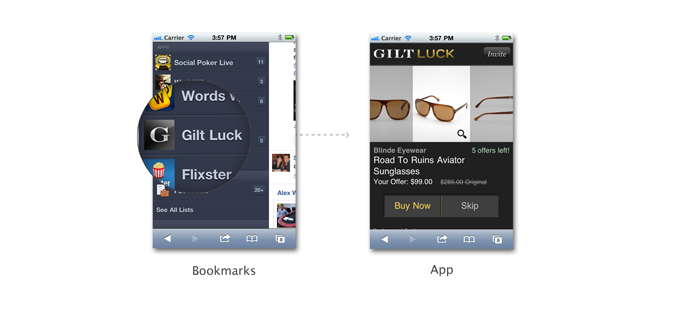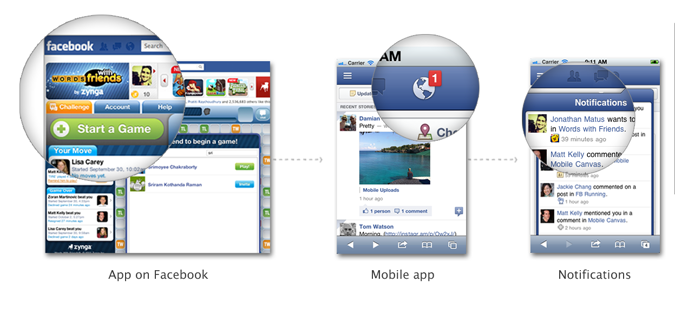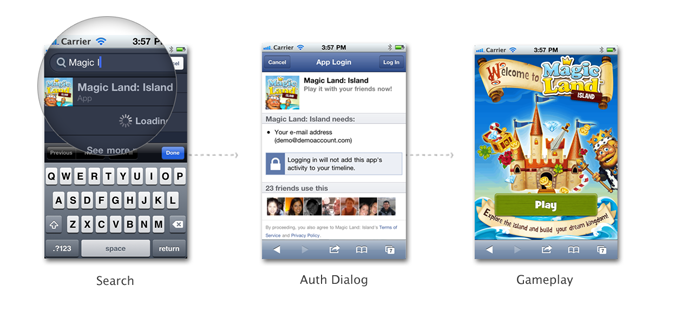Social Apps - Now on Mobile
- Transfer
Behind the analysis of the functionality of the long-awaited Facebook application for iPad, it is easy to miss a more important innovation - the extension to mobile versions of Facebook of the opportunities that Facebook Platform developers provide. Here is an overview of these innovations:
Today, the Facebook Platform has been extended to mobile versions of Facebook, which means access to mobile sites and applications of all those channels that have already helped applications and games reach hundreds of millions of users on the web. As a developer, you can offer your application to 350 million people who use Facebook every month on mobile devices, including iPad, iPhone, iPod touch and the mobile version of our site.
We are starting to deploy applications for the Facebook Platform on mobile devices. These features are still under development. They will change as we learn more about how to fully utilize mobile devices to communicate on the network. In addition, in the near future we will extend the native support to other mobile platforms, such as Android. We are interested in seeing which applications you create using these functions and we are ready to work with you to improve them.
Social channels , such as bookmarks, invitations, and news feeds , play a leading role in how people discover applications and how applications are distributed through the Facebook Platform. Until now, these channels have been available only to Facebook sites and applications in the “desktop” version of Facebook. Below we describe the main changes that we have introduced so that social channels become available on mobile devices.
Bookmarks are one of the key mechanisms for re-engaging users on Facebook apps. When a user accesses your application, a bookmark on it is automatically added to the Facebook navigation bar.
Now people who use Facebook on their iPhone or iPad, as well as the mobile version of the site ( m.facebook.com ), will see bookmarks leading to the mobile versions of these applications. When the user clicks on the bookmark icon in our application on the iPhone or iPad, either the corresponding iOS application will start (if it is already installed) or the user will be redirected to the App Store. Bookmarks on the mobile site will lead to the mobile web version of your application.

A new invitation dialog in the mobile version allows users to invite their friends to the application. Friends will be able to receive an invitation to any of the platforms where this application is supported. For example, if a user plays your game on Facebook.com, his friends will be able to answer his request from his iPhone. As in the case of bookmarks, users clicking on the invitation will go straight to the mobile version of your application, whether it is an iOS version or a mobile web version.

It was possible to use the news feed dialog so that applications could publish messages about important events, however, until that moment, users could not interact with these messages in the feed on their mobile devices. Now, having seen some interesting message from some application in your feed, you can click on it and immediately get into the mobile version of this application, whether it is an iOS version or a mobile web version.

Authenticated links is a new feature that authenticates all Facebook traffic to your application. When users search and find a new application, or click on the link in the news feed, or respond to an invitation from a mobile application that they had not used before, they will be asked to log in to Facebook before switching to the application. This will give developers the opportunity to provide users with the most personalized approach from the very beginning of working with the application.

Also today, we are extending Facebook Credits support to mobile applications. Facebook Credits is a payment system that gives users a safe and easy way to pay for virtual and digital purchases. Mobile applications are subject to the same rules as Facebook applications, including the requirement to use Facebook Credits as the only payment mechanism. Facebook Credits are not allowed for iOS applications or mobile web applications running inside the Facebook iOS application.
Of the 350 million people who access Facebook from their mobile devices every month, about half use the web version and half use applications for various mobile OSs. Social applications are primarily a way to communicate with your friends, and the best of them are those that have both iOS and the web version, so we recommend that you think about how to ensure the most complete Facebook audience coverage using both versions.
If you already have an iOS application, the integration will be very simple - you just need to implement Single Sign-On using our iOS SDK. If you are creating a mobile web application, you can use the capabilities of HTML5 to create an application that works on all modern devices, as well as implement additional functions using technologies such as PhoneGap. Check out our documentation for mobile developers to learn more.
We worked closely with a number of leading developers to create cool mobile web applications, and this is just the beginning. Already today you can try the Audiovroom, Branchout, Flixster, Gilt Groupe and Huffington Post apps, as well as games from EA, Moblyng, Storm8, Wooga and Zynga. You can try these applications by following the link fb.me/mobileappshowcasefrom your phone or tablet. Most of them are built on HTML5, which provides them with the same functionality on iOS, Android and other mobile platforms.
And on October 28th we will hold a Mobile Hack conference in Silicon Valley so that developers can learn more about these new features and create super apps. You can register for the conference here .
Today, the Facebook Platform has been extended to mobile versions of Facebook, which means access to mobile sites and applications of all those channels that have already helped applications and games reach hundreds of millions of users on the web. As a developer, you can offer your application to 350 million people who use Facebook every month on mobile devices, including iPad, iPhone, iPod touch and the mobile version of our site.
We are starting to deploy applications for the Facebook Platform on mobile devices. These features are still under development. They will change as we learn more about how to fully utilize mobile devices to communicate on the network. In addition, in the near future we will extend the native support to other mobile platforms, such as Android. We are interested in seeing which applications you create using these functions and we are ready to work with you to improve them.
Social channels on mobile devices
Social channels , such as bookmarks, invitations, and news feeds , play a leading role in how people discover applications and how applications are distributed through the Facebook Platform. Until now, these channels have been available only to Facebook sites and applications in the “desktop” version of Facebook. Below we describe the main changes that we have introduced so that social channels become available on mobile devices.
Bookmarks
Bookmarks are one of the key mechanisms for re-engaging users on Facebook apps. When a user accesses your application, a bookmark on it is automatically added to the Facebook navigation bar.
Now people who use Facebook on their iPhone or iPad, as well as the mobile version of the site ( m.facebook.com ), will see bookmarks leading to the mobile versions of these applications. When the user clicks on the bookmark icon in our application on the iPhone or iPad, either the corresponding iOS application will start (if it is already installed) or the user will be redirected to the App Store. Bookmarks on the mobile site will lead to the mobile web version of your application.

Invitations
A new invitation dialog in the mobile version allows users to invite their friends to the application. Friends will be able to receive an invitation to any of the platforms where this application is supported. For example, if a user plays your game on Facebook.com, his friends will be able to answer his request from his iPhone. As in the case of bookmarks, users clicking on the invitation will go straight to the mobile version of your application, whether it is an iOS version or a mobile web version.

timeline
It was possible to use the news feed dialog so that applications could publish messages about important events, however, until that moment, users could not interact with these messages in the feed on their mobile devices. Now, having seen some interesting message from some application in your feed, you can click on it and immediately get into the mobile version of this application, whether it is an iOS version or a mobile web version.

Authentication Links
Authenticated links is a new feature that authenticates all Facebook traffic to your application. When users search and find a new application, or click on the link in the news feed, or respond to an invitation from a mobile application that they had not used before, they will be asked to log in to Facebook before switching to the application. This will give developers the opportunity to provide users with the most personalized approach from the very beginning of working with the application.

Facebook Credits
Also today, we are extending Facebook Credits support to mobile applications. Facebook Credits is a payment system that gives users a safe and easy way to pay for virtual and digital purchases. Mobile applications are subject to the same rules as Facebook applications, including the requirement to use Facebook Credits as the only payment mechanism. Facebook Credits are not allowed for iOS applications or mobile web applications running inside the Facebook iOS application.
Where to begin
Of the 350 million people who access Facebook from their mobile devices every month, about half use the web version and half use applications for various mobile OSs. Social applications are primarily a way to communicate with your friends, and the best of them are those that have both iOS and the web version, so we recommend that you think about how to ensure the most complete Facebook audience coverage using both versions.
If you already have an iOS application, the integration will be very simple - you just need to implement Single Sign-On using our iOS SDK. If you are creating a mobile web application, you can use the capabilities of HTML5 to create an application that works on all modern devices, as well as implement additional functions using technologies such as PhoneGap. Check out our documentation for mobile developers to learn more.
We worked closely with a number of leading developers to create cool mobile web applications, and this is just the beginning. Already today you can try the Audiovroom, Branchout, Flixster, Gilt Groupe and Huffington Post apps, as well as games from EA, Moblyng, Storm8, Wooga and Zynga. You can try these applications by following the link fb.me/mobileappshowcasefrom your phone or tablet. Most of them are built on HTML5, which provides them with the same functionality on iOS, Android and other mobile platforms.
And on October 28th we will hold a Mobile Hack conference in Silicon Valley so that developers can learn more about these new features and create super apps. You can register for the conference here .
